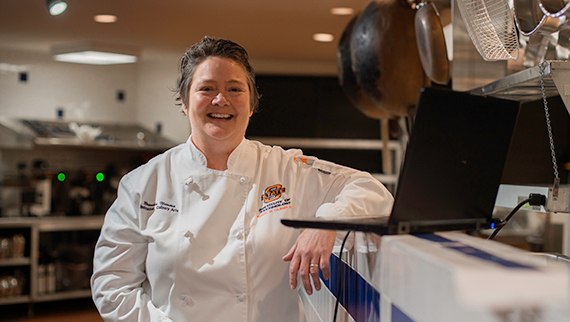
OSU Institute of Technology faced the challenge of adapting the unique, hands-on, in-person training to keep students, faculty and staff safe during the COVID-19 pandemic while still providing the same quality of education the institution is known for. The faculty had to quickly adapt their teaching styles and curriculum to accommodate this unforeseen pandemic.
"Faculty were encouraged to look at everything through the eyes of the students. Students are people, just as we are. They too are experiencing a pandemic for the first time in their lives," said Dr. Lisa Weis, dean of the School of Arts, Sciences & Health. "They too are concerned about their loved ones, layoffs and the spread of the virus. However, they're also concerned about their education, the quality of that education and their ability to meet program standards given the change to a new delivery style, requiring technology of which they had little or no knowledge."
OSUIT Culinary Arts instructor Chef Bren Nimmo, was approached by the Center for the Advancement of Foodservice Education (CAFÉ) to share information on the culinary distance learning education model and any plans to continue for the following year.
"Adaptability as a faculty member is important," said Nimmo. "My approach to teaching is similar to leading a kitchen. You have a diverse staff with different experience levels, and you have to bring everything together in a limited amount of time. I've learned you can make a plan, work the plan, make real-time adjustments to the plan, and despite your best efforts, things do not always go according to plan. It is critically important to be able to shift. That is one piece of wisdom that I strive to impart to our graduates."
Fortunately, Nimmo studied Quality Matters (QM) standards for distance learning and had experimented with blended delivery with a breakfast course before 2020.
"I welcomed the sudden shift to online learning as an opportunity to test these ideas," said Nimmo. "A blended or flipped classroom is perfectly suited to my style of teaching. It also offers a bit of flexibility to our students, especially ones with jobs. Most importantly, I believe it enhances learning outcomes since students are challenged to think, study and reflect outside the kitchen lab."
Nimmo began by holding herself accountable. Her first move was to study her course outcomes and rethink how to create engaging online assignments, so everyone would not drop out of the program in frustration, which proved to be a success.
"My goal was for students to experience the same connection to the blended learning activities as they did in the kitchen," said Nimmo. "After reading the positive feedback from my course evaluations, I finally breathed a sigh of relief."
She worked hard to make her online classroom welcoming, organized and easy to navigate by creating how-to documents and videos so they could continue their degree path without interruption.
"While disheartening only to have class two days a week, the transition to blended learning was pretty smooth," said Natasha Hall, Culinary Arts student.
Nimmo added a few new technical tools to her arsenal, took crash courses and quick tutorials, among other things, to adapt the course and successfully keep students on track to graduate.
Second, she extended grace to her students as it was extended to her by the deans and leadership teams. She accepted alternative assignments if necessary to accommodate everyone, assignment packets for students with connectivity issues and even weekly Zoom meetings to boost morale.
One of the biggest challenges for Nimmo was to create a fully online capstone course. The culinary capstone class is a face-to-face, three-week intensive series of cooking exams. An online capstone course was nonexistent.
"Every program outcome is attached to these exams at the mastery level, and I had never taught the course. It was a very daunting task," said Nimmo. "When there is a need, teachers worldwide are finding ways of getting it done. So, if my students would keep showing up, I was determined to show up for them."
Nimmo says she will continue to incorporate the modifications made to the curriculum as needed.
"I will use any and all strategies that keep my students engaged," she said. "The most important aspect of our culinary program is the hands-on practice with repetition. I consider online learning activities a complement to this type of drill and practice."
Nimmo said she learned three main points during this time. “1. Caring for students is key. 2. It takes a village. The support and encouragement my students and I received from everyone at OSUIT allowed for me to focus on the success of my students. 3. Effort and excellence became a mantra for myself and an expectation for my students.”
Dean Weis said she is proud of how the faculty within the Culinary Arts program and the School of Arts, Sciences & Health handled the challenge.
"Communication between faculty and students skyrocketed, allowing for information sharing, perspective-taking and a collaborative environment," said Weis. "Faculty and students learned a great deal over the last year in terms of the value of perspective and the importance of celebrating progress rather than perfection."
Overall, the Culinary Arts staff, faculty and students overcame many challenges throughout the year by finding creative solutions to keep everyone healthy and attending class.
"If you challenge learners with high expectations and an organized lesson, couple it with flexibility and empathy, you can sit back and watch amazing things happen," said Nimmo. "The extraordinary challenge of moving everything online in a few short weeks pushed us all out of our comfort zone. The upside for me after the fact is I have new teaching tools in my arsenal."
